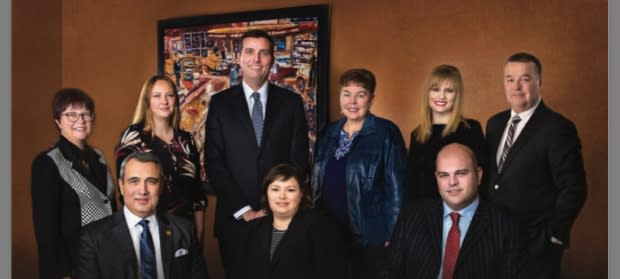'They don't seem to follow any rules': Report into NB Liquor could shed light on many questions
New Brunswick's top accountant has been tasked by the provincial government to sort out how NB Liquor came to lose track of what day its fiscal year ended in 2018 and why the error cost the agency — and the province — more than $400,000 to fix.
The year-end mix up is not the only unusual accounting and compensation event to happen at NB Liquor in recent years. While Paul Martin. the province's comptroller, works through his report's central assignment, he may also find answers to other important questions.
Here are some of the questions Martin is looking into:
1. Why was NB Liquor's 2018 profit target lowered to $165 million from $172.9 million despite corporate goals calling for profits to grow?
NB Liquor's payout of a record amount in employee profit-sharing bonuses in 2018 was caused, in part, by an extra week of sales added to its fiscal year. The Crown corporation realized its fiscal year did not end on March 25 as it had been budgeting for, but on April 1.
It was a critical error Martin has been asked to investigate. But there was a second and more significant factor that helped boost employee bonuses that year: a substantial lowering of profit targets employees had to beat to earn incentive pay.

In 2017, the year before the record bonuses, NB Liquor reported a drop in net income to $168.4 million — that's $3.2 million below results from 2016 and $4.5 million short of its 2017 profit target of $172.9 million.
Because the target was missed by such a wide margin, profit sharing bonuses to employees dried up in 2017, falling 88 per cent from what was earned in 2016.
Following that disappointment, NB Liquor lowered its profit target in 2018 by $7.9 million — 4.6 per cent — to a more beatable $165 million.
NB Liquor has suggested this was caused by problems it was having with beer sales. But it was unusual because it contradicted NB Liquor's longstanding corporate objective of achieving constant profit growth.
In 2012 and again in 2016 NB Liquor adopted four-year plans for itself that included "annual net income growth of 1.5 per cent" as a central pillar.
The liquor corporation's fell 1.9 per cent in 2017 and that prompted NB Liquor to set a target for profits to drop again. This time NB Liquor estimated profits would fall by two per cent. This was the opposite of the annual profit growth called for in NB Liquor's long-range planning.
Lowering the profit target for 2018 might not have fit long-term growth objectives but it did have a dramatic effect on the employee bonus program.

Profits in 2018, including the extra week of sales, ended the year in a virtual tie with 2017 at $168.4 million.
However. employees earned almost 10 times more bonus money in 2018 ($978,750) than they had in 2017 ($100,173), because the profit targets for each year were so different.
Profit-sharing payments surged but without profits growing, an unusual feature of NB Liquor's unusual 2018 fiscal year that Martin's review is certain to be confronted with
2. Why hasn't NB Liquor been more open about a bonus program it operates for key executives?
In May 2017, NB Liquor appeared in front of the legislature's Standing Committee on Crown Corporations. At that meeting, Brian Harriman, the former NB Liquor president, told MLAs that although the corporation had a profit-sharing program for unionized employees, it did not extend to managers.
"There is no management bonus program," Harriman said in response to a question from PC MLA Jeff Carr about bonuses at the agency.
"It is a sales incentive program for bargaining members only, so assistant managers and below."
Little information shared about bonus program
Harriman did not mention it at the time, but NB Liquor was operating a bonus program for its executives.
Mark Barbour, a spokesperson for NB Liquor, said Harriman's comments did not mislead MLAs because he was responding to a question about bonuses for NB Liquor's middle managers — not its upper level executives.
But the agency has publicly shared little information on the program, including who oversees it and what kind of performance it rewards.
NB Liquor has said over the last two fiscal years, its upper level executives have been paid a combined $126,346 in bonuses, including a high of $69,423 in the critical 2018 fiscal year.
But what's still unknown is how many executives share the money or how the program even works. This is basic information that previous government agencies have been criticized for not sharing.
In 2008, Mike Ferguson, the province's former auditor general, conducted a detailed examination of bonuses paid to New Brunswick pension managers and one of the key recommendations made in that review was that basic information about the bonus program should be explained publicly in an annual report.

It is likely NB Liquor executives played key roles in the two decisions that boosted bonuses in 2018.
What is unclear — and what Martin may be able to reveal — is how much those decisions benefited executives themselves and how much attention the board of directors has paid into that issue.
3. Why does NB Liquor issue press releases about its quarterly results instead of financial statements like NB Power?
Similar to NB Power, NB Liquor is required by legislation to release quarterly financial results.
But while NB Power presents formal income, expense and profit statements, NB Liquor issues press releases with minimal and sometimes misleading information.
They don't seem to follow any rules. - Matthew Wegener, UNB accounting professor
Matthew Wegener, an accounting professor at the University of New Brunswick, calls NB Liquor's quarterly reports some of the worst he's ever seen.
He said they are vague and follow no real accounting standard. One press release showed just 12 weeks of sales, even though the minimum length of a fiscal quarter is 13 weeks.
"A 12-week quarter is not a quarter," said Wegener.
"They did some creative stuff with these reports. They did all sorts of funny stuff."
For example, a NB Liquor news release on May 4, 2018 after the mishandled year end mentions an unusually large $9 million jump in sales. But the news release credits good management for the increase — not the extra week added to the quarter required by management's fumbling of year-end dates.
"NB Liquor has experienced a great fourth quarter," Harriman said in the release.
'Horribly misleading'
In a subsequent news release in July 2018, NB Liquor announced first quarter sales for the 2019 fiscal year of $96.6 million — an amount it also called an increase.
"We have grown our business by $1.5 million in the first quarter versus last year's sales," Harriman said.
Taken together the two press releases described sales growth of $10.5 million over two quarters even though NB Liquor knew at the time sales had grown 59 per cent less than that, by just $4.3 million.

The two news releases cut out an entire week of sales from the previous year in their comparisons, making growth appear much stronger than it was.
"It's horribly misleading," said Wegener
"It's a missing week in their quarterly reports. It's just missing. That of course causes all sorts of comparability problems. They don't seem to follow any rules."
Wegener said he believes NB Liquor should be made to present quarterly statements similar to NB Power. He said he hopes Martin will look into this issue during his review of other matters at the agency.
"It would be great to see if they provide some recommendations on how they can improve the reporting," Wegener said.
"That would be ideal."

